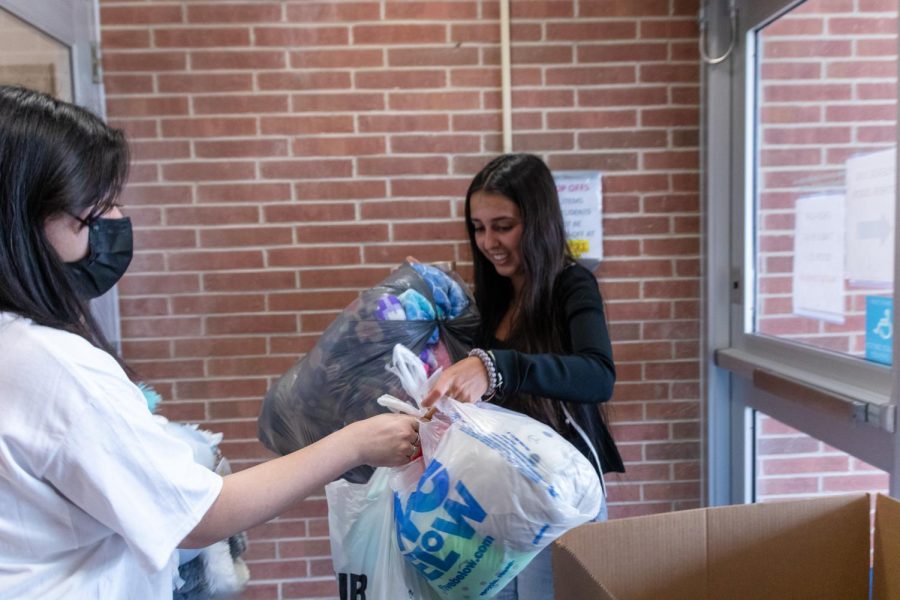One day around two and a half years ago, senior Marlee Szabo decided to quit. However, it wasn’t a major addiction or detrimental way of life that caused Szabo to decide she had enough. Rather, Szabo chose to embrace a completely different lifestyle, one that she felt better represented her opinions. Szabo resolved to stop eating meat and become a vegetarian.
“I decided to look into (vegetarianism) more, and I found that it had a lot of environmental benefits as well as the fact that I was concerned with animal rights,” Szabo said. “I struggled with the idea people have of ‘Oh, I eat beef, but I wouldn’t eat a dog.’ That just doesn’t make sense to me. I don’t understand the difference because I’d have a cow as a pet, too.”
Szabo is one of many Americans who have recently begun to consume reduced amounts of meat, if not cutting it out altogether. According to recent U.S. Department of Agriculture (USDA) projections, the United States will see a sharp drop in meat consumption this year, with Americans expected to eat 12 percent less meat and poultry than they ate five years ago. Time reports that the average American will eat 165.5 pounds of beef and poultry, compared to 189 pounds in 2007. Furthermore, initiatives such as the Meatless Monday events that are in association with Johns Hopkins’ Bloomberg School of Public Health are attracting attention in big cities such as New Orleans and Phoenix and furthering the vegetarian cause.
 Registered dietician David Creel, who works at St. Vincent Bariatric Center of Excellence in Carmel, said he agrees that vegetarianism is growing compared to the past. Creel said he attributes the overall trend to people being more comfortable with eating differently as they can still maintain a healthy diet and to certain people’s concern with the moral or ethical treatment of animals. However, with adolescents specifically, Creel said he thinks the trend has more to do with curiosity and finding a way to identify oneself.
Registered dietician David Creel, who works at St. Vincent Bariatric Center of Excellence in Carmel, said he agrees that vegetarianism is growing compared to the past. Creel said he attributes the overall trend to people being more comfortable with eating differently as they can still maintain a healthy diet and to certain people’s concern with the moral or ethical treatment of animals. However, with adolescents specifically, Creel said he thinks the trend has more to do with curiosity and finding a way to identify oneself.
“I would think that teenagers are kind of looking for an identity in lots of different ways, and it’s a time to experiment with lots of different interests,” Creel said. “(Adolescence) would be an ideal time to incorporate what we have learned into our lives.”
Szabo said she too has seen a growing frequency of vegetarianism in the United States, compared to China, which is where she lived when she first decided to become a vegetarian.
“I certainly saw a wider variety of vegetarian options available for the public,” Szabo said. “Before I left (the United States) in 2006, I didn’t really see that much prevalence, but when I moved back in 2011, I saw it had increased.”
However, despite the growing presence of vegetarians and vegetarian options throughout the nation, Creel said he believes that there can be some social difficulties associated with vegetarianism. According to Creel, meat is still a large part of the American diet, and when individuals restrict their consumption, it can be difficult to accommodate them.
“When I grew up, it was like, ‘What are we having for dinner?’ and mom says, ‘We’re having chicken or pork chops,’ and it was a very meat-centered diet,” he said. “Vegetarians sometimes don’t fit in very well, like when they go to someone’s house and the main part of the meal is meat, it’s hard to find good options…it’s like saying I’m not going to eat sugar. You can do it, and it’s probably a healthier diet, but so many things have sugar in it, it takes great pains to avoid it.”
Szabo said she has had personal experience with feeling like a burden when she goes out to eat with her friends or goes to a friend’s house. However, though that aspect of vegetarianism is not enjoyable for Szabo, she said often she has found a simple solution for finding something to eat, such as eating pasta without the meat sauce.
Senior Amelia Nelson, who like Szabo said she chose to become a vegetarian due to concerns with the treatment of animals, agrees that her new vegetarian lifestyle has given her some trouble, especially at work.
“I work at Bub’s (Burgers), which is hard, just because everything looks so good and I have to carry it out to tables, but I can’t eat it myself,” Nelson said. “And it really sucks when my manager has gotten mad at me before because when tables will ask me ‘Oh, what does the elk burger taste like?’ I have nothing to say to that because I’ve never had it before.”
Despite these social difficulties, though, Creel said if the diet is well planned, teenagers should have no trouble with maintaining a vegetarian diet, especially with the support of their family. According to Creel, at a younger age, children don’t have the cognitive ability to plan healthy vegetarian diets, leading them to abandon the lifestyle quickly. However, if a parent is well-informed and supports the decision, vegetarianism can still be effectively adopted.
“As a teenager, you might have the cognitive ability to plan well, but you’re typically not buying your own food.” Creel said. “So I think it really depends on the family dynamics and the knowledge-base of the parents and how willing they are to work along with the child or adolescent.”
Nelson said although her friends and family were against her vegetarianism before due to health and nutritional concerns, they have eventually adapted to the idea of her being a vegetarian and now enable her to do so.
“My best friend’s family still tries to make me eat meat whenever I go over there because they think I’m too skinny, but my dad has really gotten used to the idea of it,” Nelson said. “He’s retired, so he spends some of his time making me tofu and things, and it’s really great.”
Nelson also said her family’s support is a main factor as to why she probably will never go back to eating meat again. According to Nelson, she said if she did, she would become sick and not be able to continue eating meat as she has abstained from it for so long.
Szabo agreed with Nelson and said she has no real reason to go back to eating meat, despite the minor inconveniences vegetarianism has brought her.
“I don’t really miss meat or crave it that often,” Szabo said. “It was pretty easy to separate with and so unless I have a good reason to, I wouldn’t look back.”


































![British royalty are American celebrities [opinion]](https://hilite.org/wp-content/uploads/2024/03/Screenshot-2024-03-24-1.44.57-PM.png)


















![Chelsea Meng on her instagram-run bracelet shop [Biz Buzz]](https://hilite.org/wp-content/uploads/2024/04/IMG_2446-1200x838.jpg)
![Review: Quiet on Set: The Dark Side of Kids TV is the long awaited exposé of pedophilia within the children’s entertainment industry [MUSE]](https://hilite.org/wp-content/uploads/2024/04/unnamed.jpg)
![Review: “The Iron Claw” cannot get enough praise [MUSE]](https://hilite.org/wp-content/uploads/2024/04/unnamed.png)
![Review: “The Bear” sets an unbelievably high bar for future comedy shows [MUSE]](https://hilite.org/wp-content/uploads/2024/03/unnamed.png)
![Review: “Mysterious Lotus Casebook” is an amazing historical Chinese drama [MUSE]](https://hilite.org/wp-content/uploads/2024/03/0.webp)
![Review in Print: Maripaz Villar brings a delightfully unique style to the world of WEBTOON [MUSE]](https://hilite.org/wp-content/uploads/2023/12/maripazcover-1200x960.jpg)
![Review: “The Sword of Kaigen” is a masterpiece [MUSE]](https://hilite.org/wp-content/uploads/2023/11/Screenshot-2023-11-26-201051.png)
![Review: Gateron Oil Kings, great linear switches, okay price [MUSE]](https://hilite.org/wp-content/uploads/2023/11/Screenshot-2023-11-26-200553.png)
![Review: “A Haunting in Venice” is a significant improvement from other Agatha Christie adaptations [MUSE]](https://hilite.org/wp-content/uploads/2023/11/e7ee2938a6d422669771bce6d8088521.jpg)
![Review: A Thanksgiving story from elementary school, still just as interesting [MUSE]](https://hilite.org/wp-content/uploads/2023/11/Screenshot-2023-11-26-195514-987x1200.png)
![Review: When I Fly Towards You, cute, uplifting youth drama [MUSE]](https://hilite.org/wp-content/uploads/2023/09/When-I-Fly-Towards-You-Chinese-drama.png)
![Postcards from Muse: Hawaii Travel Diary [MUSE]](https://hilite.org/wp-content/uploads/2023/09/My-project-1-1200x1200.jpg)
![Review: Ladybug & Cat Noir: The Movie, departure from original show [MUSE]](https://hilite.org/wp-content/uploads/2023/09/Ladybug__Cat_Noir_-_The_Movie_poster.jpg)
![Review in Print: Hidden Love is the cute, uplifting drama everyone needs [MUSE]](https://hilite.org/wp-content/uploads/2023/09/hiddenlovecover-e1693597208225-1030x1200.png)
![Review in Print: Heartstopper is the heartwarming queer romance we all need [MUSE]](https://hilite.org/wp-content/uploads/2023/08/museheartstoppercover-1200x654.png)






















![Review: Ladybug & Cat Noir: The Movie, departure from original show [MUSE]](https://hilite.org/wp-content/uploads/2023/09/Ladybug__Cat_Noir_-_The_Movie_poster-221x300.jpg)

![Review: Next in Fashion season two survives changes, becomes a valuable pop culture artifact [MUSE]](https://hilite.org/wp-content/uploads/2023/03/Screen-Shot-2023-03-09-at-11.05.05-AM-300x214.png)
![Review: Is The Stormlight Archive worth it? [MUSE]](https://hilite.org/wp-content/uploads/2023/10/unnamed-1-184x300.png)



